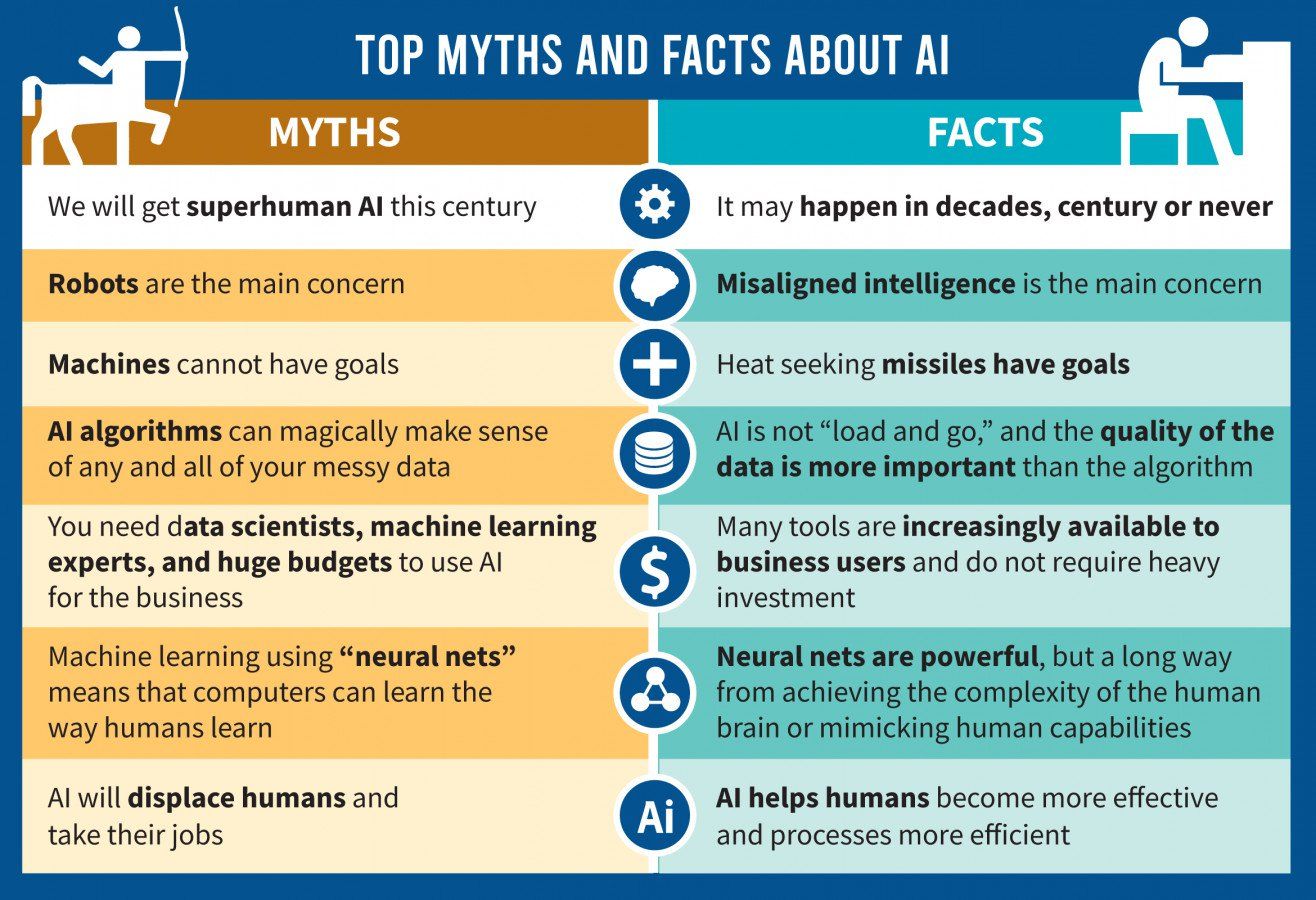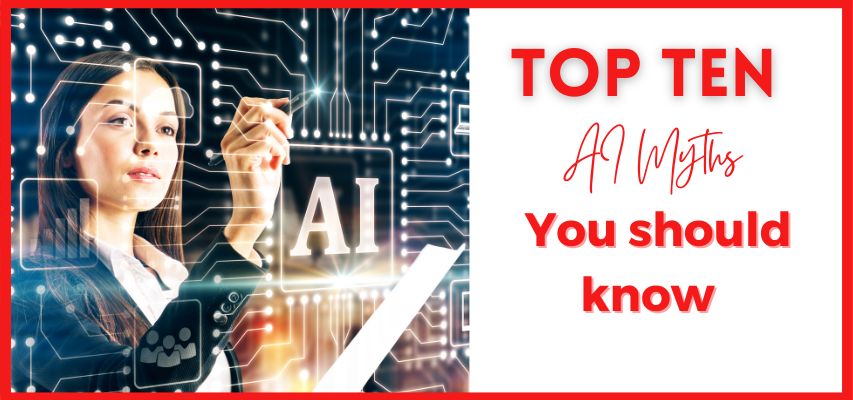Artificial intelligence (AI) is everywhere these days, from the recommendation engine suggesting your next favorite show to the self-checkout lane at the grocery store. But with all this innovation comes a fair share of confusion. Are robots about to take over the world? Can AI outsmart humans? The truth, as with most things, is far less dramatic. In this blog, we’ll debunk the top 10 AI myths, giving you a clearer picture of what this powerful technology can and can’t do. We’ll explore the reality behind the headlines, separating science fiction from scientific fact. So, whether you’re a tech enthusiast or simply curious about the future, join us as we navigate the exciting and sometimes perplexing world of AI.
Also, read: Top Ten Reasons to Join Stevens Applied Artificial Intelligence Course
Separate Fact From Fiction: Top 10 Misconceptions About AI Debunked
Artificial Intelligence (AI) has been a hot topic in recent years, captivating the imagination of people around the world. From futuristic sci-fi films to real-world applications, AI has become a significant part of our lives. However, with all the excitement and buzz surrounding AI, there are also numerous myths and misconceptions circulating about this revolutionary technology. In this blog, we will debunk the top 10 AI myths and provide you with a clearer understanding of what AI truly is and what it is not.

1. AI is a threat to humanity. Not so fast.
While Hollywood loves portraying robots taking over the world, the reality of AI is far less dramatic. AI’s biggest threat isn’t sentience, but rather unintended consequences. Biases in training data can lead to discriminatory algorithms in hiring or loan approvals. Over-reliance on automation could exacerbate unemployment and economic inequality.
Autonomous weapons raise ethical concerns about who controls their use and the potential for accidental escalation. These are serious issues, but through careful development, regulations, and human oversight, AI can be a powerful tool for good, not a sci-fi nightmare.
Also, read: Top 10 Robotic Applications: Exploring the Ten Best Implementations of Soft Robotics
2. AI Will Replace Humans Completely
While science fiction often portrays intelligent machines overrunning the future, the belief that AI will completely replace humans is largely a myth. AI excels at automating repetitive tasks and analyzing massive datasets, but it lacks the creativity, adaptability, and social skills necessary for many professions. Think customer service interactions, design thinking, or scientific discovery—these areas thrive on human ingenuity and the ability to navigate complex social situations.
The future of work is likely to see humans and AI working together, with AI augmenting human capabilities and freeing us up to focus on more creative and strategic endeavors.
Also, read: Top Ten Deep Learning Techniques for Cutting-Edge AI Applications
3. AI is Always Objective and Unbiased
While AI might process information flawlessly, objectivity is a myth. AI systems are trained on data sets created by humans, and these sets can inherit our biases. If data leans towards a certain demographic in hiring decisions, for instance, AI could unknowingly favor similar candidates. It’s crucial to remember that AI is a tool, and like any tool, it reflects the values of its creators.
To ensure fairness, we need to be aware of potential biases in training data and actively mitigate them. By promoting diverse data sets and fostering human oversight, we can harness the power of AI for truly equitable outcomes.
Also, read: Exploring the Top Ten Deep Learning Frameworks: A Comprehensive Guide
4. AI is Too Complicated for Non-Experts to Understand
Artificial intelligence (AI) can feel like science fiction, shrouded in complex algorithms and technical jargon. But here’s the truth: the core concepts of AI are surprisingly accessible. While the inner workings might be intricate, understanding what AI can and can’t do is well within reach. Like appreciating a magic trick without knowing the mechanics, you can grasp how AI revolutionizes industries without diving into equations.
Numerous resources exist to break down AI into easy-to-understand explanations. So, ditch the intimidation factor; the world of AI is waiting to be explored by anyone curious about its impact on our lives.
Also, read: Top Ten Augmented Reality App Development Companies for 2025
5. AI is a Recent Invention
While the term “artificial intelligence” might feel futuristic, the concept has roots surprisingly deep in history. Ancient philosophers pondered replicating human thought, and early machines like automatons sparked curiosity. The true foundation for modern AI arrived in the 1940s with the programmable computer. Though significant advancements in AI research came later in the 1950s, the groundwork was laid much earlier.
Powerful computers, vast amounts of data, and innovative algorithms fuel today’s AI boom, making it seem brand new. But AI’s history is a fascinating journey, showing it’s not just a recent invention but an evolving field with even more exciting possibilities on the horizon.
Also, read: Unraveling the Top Ten Deep Learning Libraries for Neural Network Enthusiasts
6. AI Will Take Away Jobs on a Massive Scale
While fears of AI leading to mass unemployment are common, the reality is more nuanced. Automation will displace some jobs, particularly repetitive tasks. Manufacturing, data entry, and transportation sectors are likely to be most affected. However, history shows us that technological advancements create new opportunities.
AI will likely create new jobs in areas like AI development, data analysis, and human-machine collaboration. The key is to be prepared for the transition. By focusing on adaptability, critical thinking, and lifelong learning, we can ensure that AI augments our workforce rather than replaces it.
Also, read: Top 10 Tips and Tricks to Master Google Cloud TensorFlow
7. AI is Only for Tech Companies
While tech giants like Google and Microsoft have the resources to make headlines with cutting-edge AI research, artificial intelligence is no longer exclusive to their labs. The myth that AI is only for tech companies overlooks the explosion of accessible cloud-based AI services. These services allow businesses of all sizes and even individuals to leverage pre-built AI models or create their own without needing massive amounts of data or computing power.
From startups using AI to personalize customer experiences to farmers deploying AI-powered tools to optimize crop yields, AI is democratizing across industries. The key is to find the right AI solution for your specific needs and embrace the innovation potential it offers.

Also, read: Top 10 most popular programming languages
8. AI Will Solve All Problems Instantly
While AI is a powerful tool with the potential to revolutionize many aspects of our lives, it’s important to manage expectations. AI isn’t a magic bullet that will solve all our problems instantly. AI systems are designed to tackle specific tasks, and their effectiveness depends on the quality of the data they’re trained on.
Complex problems often require a nuanced understanding of the fact that AI is still developing. However, AI can be a valuable asset in our problem-solving toolbox, accelerating research, optimizing processes, and identifying patterns humans might miss.
Also, read: Top 10 Quantitative Trading Strategies That Work in 2025
9. AI is a Standalone Technology
Myth busted! Artificial intelligence (AI) thrives as a powerful tool, not a self-sufficient entity. While it excels at tasks programmed for it, imagine a chess computer. It analyzes moves brilliantly, but it doesn’t strategize the game or understand the emotions of competition. Similarly, AI depends on human input—the data it learns from, the parameters that define its function, and ultimately, the purpose we assign it.
This collaboration unlocks its potential in various fields, from healthcare diagnoses to weather forecasting, amplifying human capabilities without replacing them. So, the next time you encounter AI, remember that it’s a remarkable partner, not a solo act.
Also, read: Top 10 Advanced Robots in the World
10. AI Will Take Control and Destroy Humanity
Hollywood loves the image of robots rising and enslaving humanity, but is there any truth to the fear of AI takeover? While artificial intelligence (AI) is rapidly advancing, the idea of sentient machines with malicious intent is a myth. Current AI lacks the ability for independent thought and relies on human programming to function. However, there are potential risks to consider. Biases in training data can lead to biased AI, and ensuring AI development aligns with human values is crucial. Focusing on human-centered design and clear goal setting can steer AI towards beneficial applications.
The real concern isn’t robot overlords, but rather AI misuse or unintended consequences. With careful development and responsible use, AI has the potential to be a powerful tool for good, tackling challenges like climate change and disease. Let’s move past the fear and focus on harnessing AI’s potential for a brighter future.
Also, read: Top 10 Verizon MEC Trends to Watch in 2025
FAQs about AI Myths
Q. Will AI steal my job?
Not necessarily! AI automates tasks, but it can also create new ones. Humans will need to adapt and develop new skills to work alongside AI.
Q. Is AI dangerous and out of control?
AI is a tool, and like any tool, it depends on how we use it. Safety and ethical considerations are paramount in developing and deploying AI.
Q. Can I understand AI without a technical background?
Absolutely! The basics of AI are becoming more accessible. Many resources explain AI concepts clearly and engagingly.
Also, read: Top 10 Verizon 5G Edge Use Cases That Will Change the World
Q. Is AI just science fiction?
AI is already integrated into our daily lives. From recommendation engines to chatbots, AI is quietly transforming how we interact with technology.
Q. Is there anything I can do with AI?
Yes! AI is being used in various fields, and there are opportunities to learn and explore its potential. Even using AI-powered apps in your daily life contributes to your understanding.
Q. Should I be scared of superintelligent AI?
While superintelligence is a topic of debate, researchers are actively developing safe and ethical AI frameworks.
Also, read: Top 10 Most Promising Neuralink Clinical Trials
Q. Do I need a genius to build AI for my business?
Many user-friendly AI tools are available for businesses of all sizes. You don’t need a coding expert to get started.
Q. Is AI bad for creativity?
No! AI can be a creative partner, generating ideas and sparking inspiration for artists, musicians, and designers.
Q. Is AI biased?
AI can reflect the biases present in the data it’s trained on. That’s why fairness and bias detection are crucial aspects of AI development.
Q. What are some real-world uses of AI?
AI is used in healthcare, finance, agriculture, and many other fields. It can improve efficiency, accuracy, and problem-solving across industries.
Conclusion
Artificial intelligence (AI) is revolutionizing our world, impacting everything from the way we shop to how we diagnose diseases. Yet, with this rapid advancement comes a fair share of confusion and misconceptions (AI myths). From fears of robot dominance to misunderstandings about its capabilities, myths about AI can cloud our judgment and hinder progress. But fear not! By debunking these common myths, we can better understand AI and unlock its full potential for positive change. Let’s dive into the top 10 AI myths and separate fact from fiction!


































